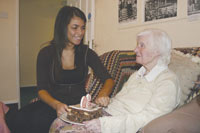
Armed with a degree but no practical experience, the next generation of adult care leaders is being trained for a rapid rise through the ranks, reports Kirsty McGregor
The adult social care workforce in England is set for a massive expansion in the next 15 years, with the number of jobs expected to nearly double to 3.1 million, according to Skills for Care.
With such a huge increase in the number of workers, it’s clear that a new generation of leaders will have to be found.
Step forward the National Skills Academy for Social Care, which launched a national social care management trainee programme for graduates in October last year with this goal in mind.
The scheme also fits with the academy’s overriding objective of raising the status of social care. Jennifer Bernard, programme director for the NSA, says people need to be aware that the sector offers a variety of career options.
“We want people to think of a career in social care as they would accountancy, law or the NHS.”
As the first 20 graduates of the 12-month programme enter the workforce, Bernard says feedback has been “extremely positive”. The scheme is running again with 27 places this year.
“The adult social care sector is so big and there are so many routes in; this is an opportunity for graduates to work out what they want to do,” says Bernard.
Although graduates are not guaranteed a job at the end of the scheme, just under half of the 2009 cohort are still working with their hosts in various capacities, according to the NSA.
Bryony Gilbert was seconded on placement to St Breock in Wadebridge, Cornwall, a residential home run by Cornwall Care, in February. She is now the assistant manager.
“Without the scheme I wouldn’t have been given that opportunity,” Gilbert says.
The 24-year-old geography and sociology graduate spent the first three months of the trainee scheme doing basic caring, kitchen and administrative work in another care home. Then she spent a month working closely with the home’s manager.
Gilbert became interested in social care through her sociology degree.
“I knew I wanted to get into social care but I wasn’t sure I wanted to do social work,” she says. “This offered one year’s direct experience in a frontline managerial role.”
At her next placement, which lasted two months, Gilbert held an administrative role, sitting on the front desk, answering the telephone and liaising with social workers.
Finally, she arrived at St Breock, where Jeff Angove took over as manager last October. Angove had heard about Gilbert from an acquaintance and asked whether she could be seconded as a trainee assistant manager.
He was impressed and encouraged her to apply for the full-time position when it was advertised in June. She now helps him to manage the home’s 63 employees.
Angove had no concerns about how the staff would react to Gilbert’s age or relative inexperience, he says.
“They quickly began to get respect for her because they can see she is passionate, but she’s also very calm and doesn’t make rash decisions,” he says.
“They understand that she’s not got as much care experience, but she’s trying to improve the situation within the home and I think that’s come through.”
For her part, Gilbert admits that learning to deal with “staffing issues” was a challenge, partly because she is managing staff who are older than her.
She has also struggled at times to deal with the emotional stress and strain that comes with managing a care home for older people.
But she is convinced she made the right career choice. “I’m a deputy now and I’d like to be a home manager once I have a good grounding,” she says.
Cornwall Care sent Gilbert on a range of courses including risk assessment, external medication training and safeguarding. She has also started working towards an NVQ level 3 in health and social care.
Studying management issues while gaining practical experience has been invaluable, she says. “When I was doing the assessments, I was writing about experiences I was having. I also have a working knowledge of how the home is run.
“I thoroughly enjoyed my placement year and feel fortunate to have secured a job.”
Angove has no doubt she will have a successful career: “She can hold her head high and say I’ve helped to run a busy home.”
“Care has the reputation of a job you do because you can’t do anything else, but it’s a specialist job. Not everybody can do it and do it well.”
Is the skills academy programme for you?
● The scheme is open to students with a 2:1 degree or above
● No social care experience is necessary
● Graduates receive a bursary of £18,000
This article is published in the 30 September issue of Community Care magazine under the heading Onwards and upwards
What do you think? Join the debate on CareSpace
Keep up to date with the latest developments in social care Sign up to our daily and weekly emails
Social care skills academy accelerates self-funding plan
Keep Up to Social Work graduates discuss their course


 ‘Dear Sajid Javid: please end the inappropriate detention of autistic people and those with learning disabilities’
‘Dear Sajid Javid: please end the inappropriate detention of autistic people and those with learning disabilities’ Ofsted calls for power to scrutinise children’s home groups
Ofsted calls for power to scrutinise children’s home groups Seven in eight commissioners paying below ‘minimum rate for home care’
Seven in eight commissioners paying below ‘minimum rate for home care’ Children and young people with SEND are ‘valued and prioritised’ in Wiltshire, find inspectors
Children and young people with SEND are ‘valued and prioritised’ in Wiltshire, find inspectors 
 Facebook
Facebook X
X LinkedIn
LinkedIn Instagram
Instagram
Comments are closed.